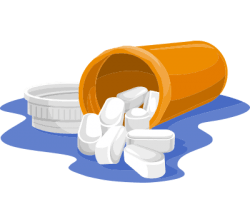
Vicodin, a combination of hydrocodone and acetaminophen (Tylenol), is one of the most popular and frequently prescribed pain medications in the US.
Consumer Reports states that doctors in this country write more prescriptions for drugs that contain hydrocodone, including Vicodin, than for any other type of medication. Medications containing hydrocodone, a semi-synthetic opioid derived from codeine, are prescribed to treat moderate to severe pain and to suppress coughing. But when taken for nonmedical reasons, or when abused in large doses, Vicodin and other prescription opiates can cause dependence, addiction, and overdose.
How Does a Vicodin Overdose Happen?
When taken according to a doctor’s orders, Vicodin is usually a safe way to control pain. An overdose occurs when the user takes more than the prescribed amount of Vicodin, takes the drug too frequently, or combines the drug with other intoxicants or prescription narcotics. An overdose can occur deliberately, when someone takes too much of a drug in order to get the euphoric effects of the opiate, or accidentally, when a patient over-medicates herself in an effort to control pain.
No matter what the reasons for overdosing may be, the end results can be dangerous or fatal. The Centers for Disease Control and Prevention states that prescription opioid overdoses cause nearly 45 deaths in the US every day, and that Vicodin is one of the most common drugs involved in these fatalities.
What Are the Effects of an Overdose?
Like other medications classified as opiates, Vicodin is a central nervous system depressant. This drug suppresses the activities of the brain and nerves, causing drowsiness, mental confusion, and a slowing of the body’s vital functions. After taking too much Vicodin, the user may experience the following effects:
- Slow breathing and heart rate
- Low blood pressure
- Cool, clammy skin
- Pinpoint pupils
- Sleepiness
- Tremors or muscle spasms
- Loss of consciousness
The risk of a fatal overdose increases if the user has taken Vicodin with alcohol, tranquilizers, sleeping pills, or other central nervous system depressants. The combination of these drugs will intensify the effects of an opiate overdose, making it much more likely that the user will die.
Getting Help for Vicodin Abuse
 Taking Vicodin for recreational reasons, or taking more of the drug than a doctor has prescribed, can put you or a loved one at risk of overdosing. A Vicodin overdose is an emergency that requires attention from health professionals. A person who becomes unconscious after taking Vicodin should never be left alone to “sleep it off” — seek medical care immediately.
Taking Vicodin for recreational reasons, or taking more of the drug than a doctor has prescribed, can put you or a loved one at risk of overdosing. A Vicodin overdose is an emergency that requires attention from health professionals. A person who becomes unconscious after taking Vicodin should never be left alone to “sleep it off” — seek medical care immediately.
Vicodin can cause physical and psychological dependence, which can eventually lead to addiction. The individually tailored opioid rehab programs at Axis are designed to empower patients to create meaningful, drug-free lives. An effective treatment program for Vicodin abuse begins with a period of detoxification, in which the medication is flushed from the system. Once the individual is safe, comfortable, and medically stable, the therapeutic work of rehab can begin.
Axis creates cutting-edge residential and outpatient treatment programs that help clients build a long-lasting, sustainable recovery. To find out more about the innovative opiate treatment programs at Axis, call our admissions team at any time.


